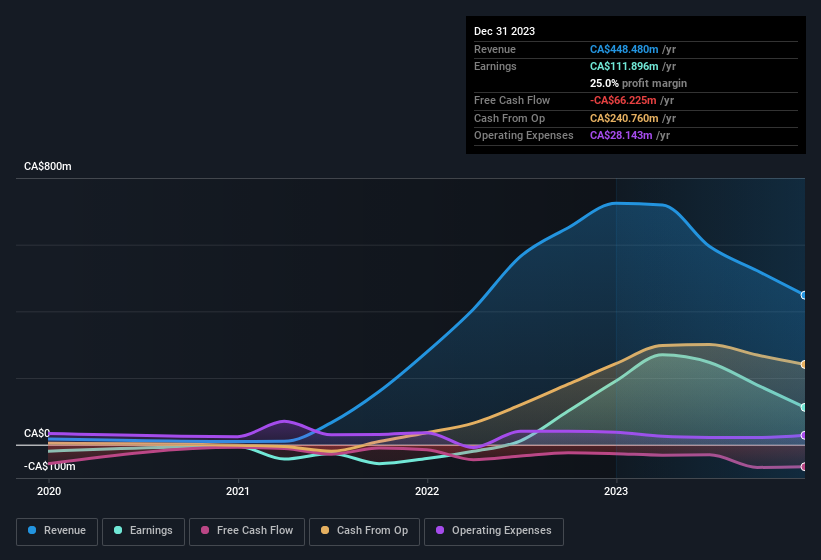- Canada
- /
- Oil and Gas
- /
- TSX:KEC
Kiwetinohk Energy's (TSE:KEC) Sluggish Earnings Might Be Just The Beginning Of Its Problems

The subdued market reaction suggests that Kiwetinohk Energy Corp.'s (TSE:KEC) recent earnings didn't contain any surprises. However, we believe that investors should be aware of some underlying factors which may be of concern.
See our latest analysis for Kiwetinohk Energy

Examining Cashflow Against Kiwetinohk Energy's Earnings
Many investors haven't heard of the accrual ratio from cashflow, but it is actually a useful measure of how well a company's profit is backed up by free cash flow (FCF) during a given period. In plain english, this ratio subtracts FCF from net profit, and divides that number by the company's average operating assets over that period. You could think of the accrual ratio from cashflow as the 'non-FCF profit ratio'.
That means a negative accrual ratio is a good thing, because it shows that the company is bringing in more free cash flow than its profit would suggest. That is not intended to imply we should worry about a positive accrual ratio, but it's worth noting where the accrual ratio is rather high. To quote a 2014 paper by Lewellen and Resutek, "firms with higher accruals tend to be less profitable in the future".
For the year to December 2023, Kiwetinohk Energy had an accrual ratio of 0.22. Therefore, we know that it's free cashflow was significantly lower than its statutory profit, which is hardly a good thing. Even though it reported a profit of CA$111.9m, a look at free cash flow indicates it actually burnt through CA$66m in the last year. Coming off the back of negative free cash flow last year, we imagine some shareholders might wonder if its cash burn of CA$66m, this year, indicates high risk.
That might leave you wondering what analysts are forecasting in terms of future profitability. Luckily, you can click here to see an interactive graph depicting future profitability, based on their estimates.
Our Take On Kiwetinohk Energy's Profit Performance
Kiwetinohk Energy didn't convert much of its profit to free cash flow in the last year, which some investors may consider rather suboptimal. Therefore, it seems possible to us that Kiwetinohk Energy's true underlying earnings power is actually less than its statutory profit. Sadly, its EPS was down over the last twelve months. Of course, we've only just scratched the surface when it comes to analysing its earnings; one could also consider margins, forecast growth, and return on investment, among other factors. In light of this, if you'd like to do more analysis on the company, it's vital to be informed of the risks involved. You'd be interested to know, that we found 1 warning sign for Kiwetinohk Energy and you'll want to know about it.
This note has only looked at a single factor that sheds light on the nature of Kiwetinohk Energy's profit. But there is always more to discover if you are capable of focussing your mind on minutiae. For example, many people consider a high return on equity as an indication of favorable business economics, while others like to 'follow the money' and search out stocks that insiders are buying. While it might take a little research on your behalf, you may find this free collection of companies boasting high return on equity, or this list of stocks that insiders are buying to be useful.
Valuation is complex, but we're here to simplify it.
Discover if Kiwetinohk Energy might be undervalued or overvalued with our detailed analysis, featuring fair value estimates, potential risks, dividends, insider trades, and its financial condition.
Access Free AnalysisHave feedback on this article? Concerned about the content? Get in touch with us directly. Alternatively, email editorial-team (at) simplywallst.com.
This article by Simply Wall St is general in nature. We provide commentary based on historical data and analyst forecasts only using an unbiased methodology and our articles are not intended to be financial advice. It does not constitute a recommendation to buy or sell any stock, and does not take account of your objectives, or your financial situation. We aim to bring you long-term focused analysis driven by fundamental data. Note that our analysis may not factor in the latest price-sensitive company announcements or qualitative material. Simply Wall St has no position in any stocks mentioned.
About TSX:KEC
Kiwetinohk Energy
An energy transition company, develops and produces of natural gas and related products in Canada.
Mediocre balance sheet and slightly overvalued.
Market Insights
Community Narratives




